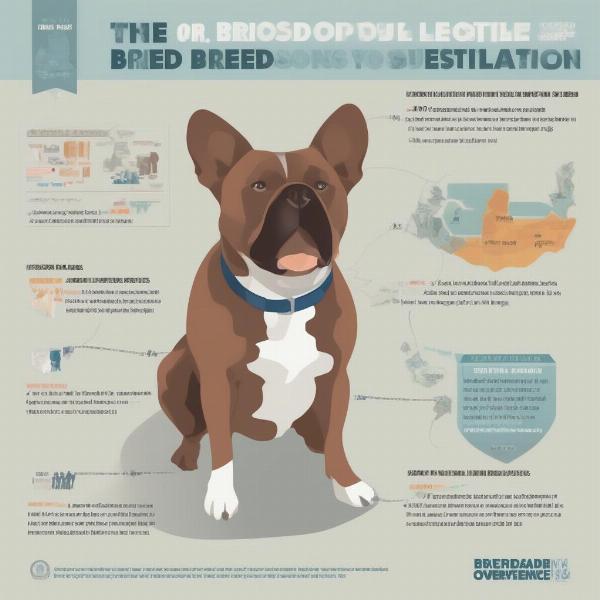The term “for-bid dog” often surfaces in online discussions, leading to confusion and misinformation. It’s crucial to understand that there’s no officially recognized breed or category of dog labeled “for-bid.” This term likely arises from misinterpretations, cultural differences, or miscommunication surrounding banned breeds, dangerous dogs, or restricted ownership in certain areas. This article aims to clarify the misconceptions around “for-bid dogs,” discuss breed-specific legislation, responsible dog ownership, and provide resources for navigating dog ownership regulations wherever you are in the world.
Decoding the “For-Bid Dog” Misconception
The idea of a “for-bid dog” likely stems from a few sources. One is the mistranslation or misunderstanding of the phrase “forbidden dog.” Some regions have breed-specific legislation (BSL) that restricts or bans certain breeds deemed “dangerous.” This can lead to the incorrect labeling of these breeds as “for-bid.” Another factor is the cultural perception of certain breeds. In some cultures, specific breeds might be viewed with suspicion or fear, leading to informal restrictions or social stigma, even without formal legal bans.
 The impact of breed-specific legislation on dog ownership.
The impact of breed-specific legislation on dog ownership.
Navigating Breed-Specific Legislation (BSL)
Breed-specific legislation is a controversial topic, with proponents arguing it protects public safety and opponents citing its ineffectiveness and unfairness. BSL often targets breeds based on physical characteristics rather than individual temperament or behavior. It’s crucial to research the specific regulations in your area, as they vary widely. Some areas may require special permits, muzzling in public, or even outright ban ownership of certain breeds.
The Importance of Responsible Dog Ownership
Regardless of breed, responsible dog ownership is paramount. Proper training, socialization, and management are key to preventing dog bites and ensuring harmonious co-existence between dogs and humans. A well-trained and socialized dog, regardless of breed, is less likely to pose a threat to public safety. Investing in obedience classes, providing adequate exercise and mental stimulation, and using appropriate restraint (leashes, harnesses) are crucial aspects of responsible dog ownership.
Finding Reliable Information on Dog Ownership Regulations
Navigating the complexities of dog ownership regulations can be challenging. Here are some valuable resources to help you understand the specific rules in your area:
- Local Animal Control: Contact your local animal control agency for information on breed-specific legislation, licensing requirements, and other local ordinances.
- Veterinary Professionals: Your veterinarian can provide guidance on breed-specific health concerns, behavioral issues, and local regulations.
- Reputable Breed-Specific Rescue Organizations: These organizations often have in-depth knowledge of breed-specific legislation and can offer valuable resources and support.
- International Canine Organizations: Organizations like the Fédération Cynologique Internationale (FCI) and the American Kennel Club (AKC) can provide information on breed standards and recognized breeds.
Conclusion
The term “for-bid dog” is a misnomer. Understanding the realities of breed-specific legislation, responsible dog ownership, and accessing reliable information are essential for all dog owners. By focusing on responsible practices and adhering to local regulations, we can create a safer and more harmonious environment for both dogs and humans. Remember, responsible ownership is the key to a positive and rewarding relationship with your canine companion.
FAQ
- What does “for-bid dog” mean? The term “for-bid dog” is not a recognized term. It’s likely a misinterpretation of “forbidden dog” and often relates to breed-specific legislation or cultural perceptions.
- Are there actually banned dog breeds? Yes, some regions have breed-specific legislation that restricts or bans certain breeds. The specific breeds vary depending on the location.
- How can I find out about dog ownership regulations in my area? Contact your local animal control, veterinary professionals, or breed-specific rescue organizations for information.
- Is breed-specific legislation effective? The effectiveness of BSL is highly debated. Many experts argue that it unfairly targets breeds based on appearance rather than individual behavior.
- What constitutes responsible dog ownership? Responsible dog ownership involves proper training, socialization, appropriate restraint, regular veterinary care, and providing for the dog’s physical and mental needs.
- Where can I find reputable dog training resources? Consult with your veterinarian, local animal shelters, or certified professional dog trainers.
- How can I advocate for responsible dog ownership in my community? Support local animal shelters, promote responsible dog ownership practices, and engage in constructive dialogue about dog-related issues.
ILM Dog is your trusted source for expert advice on all aspects of dog care, from breed selection and health to training and nutrition. We are committed to providing dog owners worldwide with the knowledge and resources they need to build strong and fulfilling relationships with their canine companions. Whether you’re a seasoned dog owner or just starting your journey, ILM Dog has the information you need. Contact us today at [email protected] or +44 20-3965-8624. We look forward to helping you navigate the world of dog ownership with confidence.